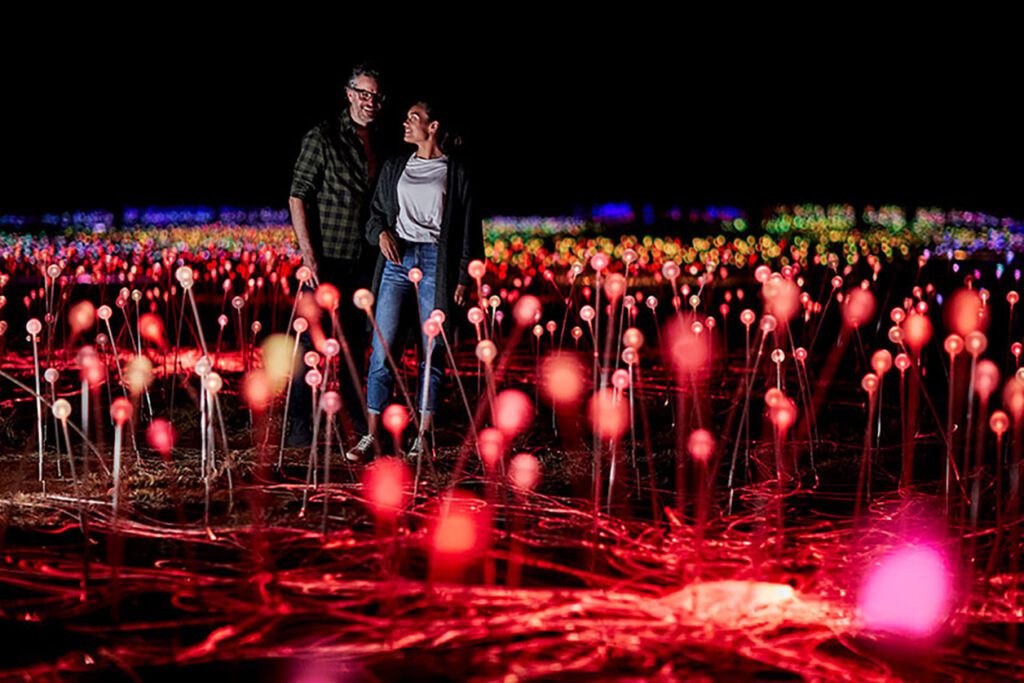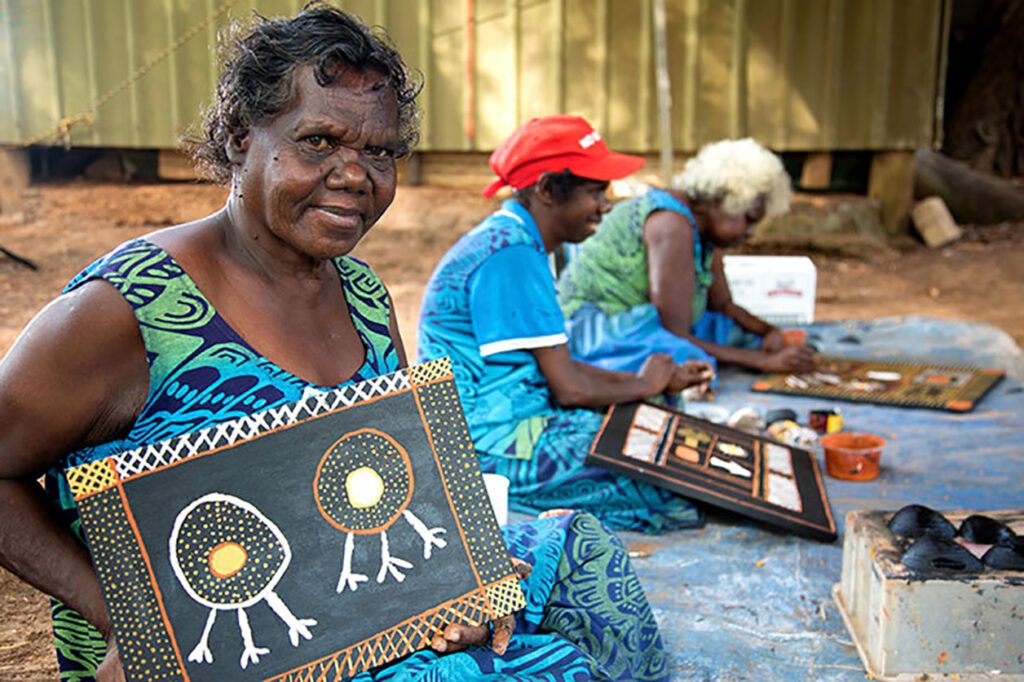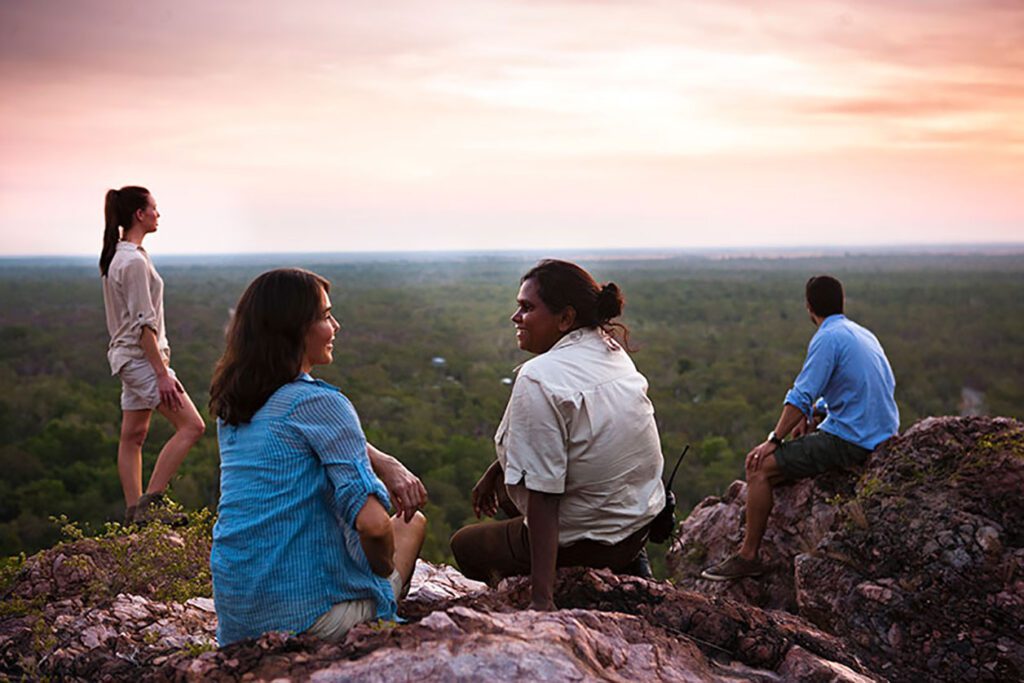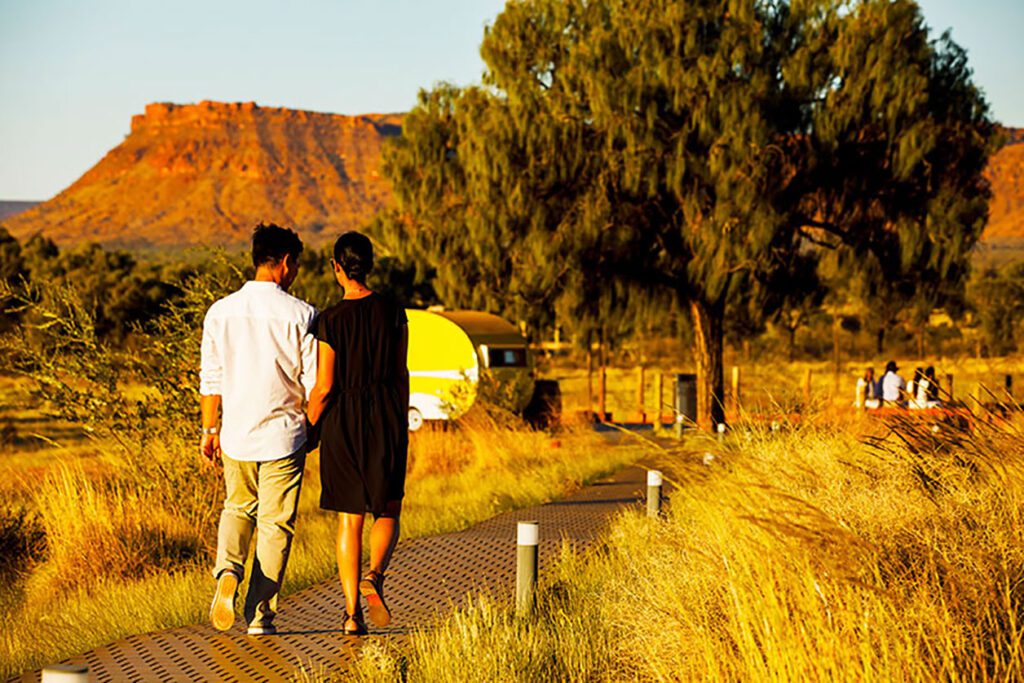If Dorothea Mackellar’s ode to Australia was used to describe a single destination, it could very well be the Northern Territory.Australia’s most sparsely
populated province is six times bigger than Britain and is the very definition of a sunburnt country and a land of sweeping plains. It’s rugged mountain ranges, drought, flooding rains, far horizons, jewelled seas, and that hot gold hush of noon.It’s a land where adventure comes easy. From the tropical Top End coastline, where the sparkling blue of the Arafura Sea touches the fine white Arnhem Land sand, south to the serrated ochre ridges of the MacDonnell Ranges stretching across the heart of the Red Centre. The Northern Territory is abundant with colour. The deep purple that washes across Uluru during a rare thunderstorm, the electric pink covering Kata Tjuta when the low evening sun strikes the domes, the clear turquoise water of the thermal Mataranka ponds, the ghostly white of Hermannsburg’s eucalypts, the rusty ochre of the Kakadu National Park escarpment, and the unimaginably deep blue of a cloudless outback sky.
And it is a place where the simple mention of a name – the white letters on a green road sign beside the Stuart Highway, script scrawled into a homemade plaque hanging above the entrance to an outback pub, the neat print of an influencer’s Instagram account – sparks the imagination.Names like Yellow Water, Mataranka, Nhulunbuy, Finke Gorge, Karlu Karlu, Simpson Desert, Tiwi Islands, Wangi Falls, Buley Rockhole, Maguk, Ubirr, Larapinta Trail, Bare Sand Island, and Nitmiluk-Katherine Gorge are legendary locations that inspire daydreams of exploring rare and rugged regions.
If the Top End and Red Centre are calling, now is the time to answer. Read on to discover the best places to visit in the Northern Territory, and don’t forget to book an unforgettable experience with AAT Kings to roam beyond the ordinary and experience adventure.
ULURU – KATA TJUTA NATIONAL PARK
It’s easy to spend hours in this esteemed national park – wandering trails through fields of desert wildflowers, watching Indigenous artists at work in an art gallery, or hearing captivating geological stories from local rangers. Any visit should begin and end with the sun.
Sunrise and sunset are magnificent times to see Australia’s most famous landmark, Uluru, with a serene atmosphere settling over the landscape as colours shift by the second.
At dawn, colour creeps across the countryside as the sun rises, bringing with it the first whispers of dry heat. At sunset, the warm hues melt into pastel tones, eventually giving way to a celestial sea of stars.
Explore with AAT Kings and watch the sunrise or set during their Uluru Sunrise & Kata Tjuta tour, which includes a walk through the dramatic domes of Kata Tjuta, followed by gourmet stargazing on their Uluru Sunset with BBQ Dinner.




TIWI ISLANDS
The Tiwi Islands—known as the “islands of smiles,” floating in the Timor Sea 90km north of Darwin—feel like another world. Despite their relative closeness, these islands remain a hidden gem, offering a rare opportunity to glimpse a unique slice of Top End life.
The Tiwi people are celebrated for preserving rich cultural traditions and are renowned across Australia for their vibrant arts scene, with artists producing breathtaking canvases, woven baskets, and colourful fabrics.
With AAT Kings, you can join the Tiwi Islands Aboriginal Culture Tour and experience scenes “seldom seen by outsiders.” Begin the day with a smoking ceremony, then visit the community of Wurrumiyanga to meet island artists and learn about their proud, enduring culture.




KAKADU NATIONAL PARK
As Australia’s largest national park, covering almost 20,000 sq/km and home to dual World Heritage listings, Kakadu National Park is the beating heart of the Top End. This “living cultural landscape” protects ecosystems ranging from floodplains and billabongs to rocky escarpments and savanna woodlands.
Kakadu is also home to a stunning array of flora and fauna, including Aboriginal rock art sites that hold 65,000 years of cultural significance for the Bininj/Mungguy people. Explore this iconic region with AAT Kings’ Kakadu National Park Explorer, which includes a Yellow Water Cruise to spot crocodiles and a guided walk at Nourlangie Rock to marvel at Indigenous art.




LITCHFIELD NATIONAL PARK
While Kakadu often takes the spotlight, locals know that Litchfield National Park is a “water wonderland” just 60 minutes from Darwin. Visitors can take refuge from the warm Top End weather in picturesque waterfalls and spring-fed plunge pools.
Float in the pools of Wangi Falls, enjoy the terraced waters of Buley Rockhole, or hike through rocky escarpments to see untouched natural vistas, including the towering Tolmer Falls.
AAT Kings offers the Litchfield National Park Waterfalls Tour, exploring breathtaking spots, including magnetic termite mounds and hidden waterholes.




ALICE SPRINGS
Known as the heart of the Red Centre, Alice Springs is a hub for cultural history and outback adventure. Whether you’re floating through the sky in a hot-air balloon or discovering the Kangaroo Sanctuary, Alice offers something for every intrepid traveller.
With AAT Kings’ A Town Like Alice Tour, visit unforgettable landmarks like the School of the Air, Telegraph Station, and the Royal Flying Doctor Service Base. Don’t miss this chance to connect with the beating heart of the outback.




KINGS CANYON & WATARRKA NATIONAL PARK
Home to breathtaking sandstone walls and palm-filled crevices, Kings Canyon in Watarrka National Park is a pristine pocket of Central Australia. Experience the legendary Rim Walk for expansive views of the Lost City, or stay closer to the canyon floor to explore lush oases and stunning waterholes.
Take on the awe-inspiring Kings Canyon Scenic Climb with AAT Kings, a guided experience that ensures you make the most of this incredible natural wonder.




DISCOVER THE REMARKABLE WITH AAT KINGS
The Northern Territory is a destination filled with adventure, culture, and natural beauty, best explored with the expertise of AAT Kings. With over 100 years of experience guiding visitors through Australia’s Top End and Red Centre, AAT Kings ensures every moment of your journey is extraordinary.
Start planning your NT holiday with a touch of adventure and a deep connection to the land. From sunrise at Uluru to swimming at Litchfield waterfalls, book your unforgettable tour experience today with AAT Kings.

